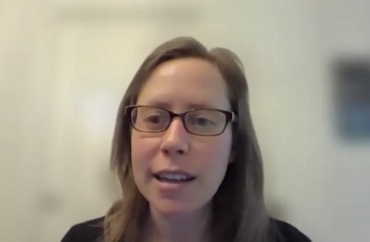
OPINION: Duke sociologist Jessi Streib breaks down why white conservatives and white liberals see Trump differently
When Americans gather around the Thanksgiving table this year, they might be sitting across from someone who voted differently from them. But Duke University Professor Jessi Streib has a way of analyzing political differences to make them easier to understand and to dial the heat down a bit.
“Why liberals see Trump as racist and sexist while conservatives don’t,” is the headline of a recent essay in Forbes. Streib has a book coming out in January with fellow sociologist Betsy Leondar-Wright along similar lines. (Further comments from Streib can be found here).
Streib (pictured) explains that white liberals tend to use “algorithmic methods” when determining if something is racist or sexist.
She explains:
Just as an algorithm can be trained to identify each case that matches a pattern, liberals know many ways that people of color and women are mistreated and call any case that fits that pattern ‘racist’ and ‘sexist.’ They do so without gathering evidence about the particular case or considering alternative explanations of what happened. They also assume that most bad things that happen to people of color and women wouldn’t have happened to white people or men, and use that presumption as evidence of racism and sexism.
But white conservatives see issues differently, according to the Duke sociologist.
“White conservatives tend to use their own logic to judge and justify whether something is racist or sexist,” according to her. “They take an investigative approach. Acting like detectives, they dig into the details of the case and try to discern exactly what happened.”
She gives a handful of examples on sensitive topics. But here is one way she breaks down Trump’s comments about Haiti and Baltimore being disgusting places to live, writing how she imagines each side might think about the issue.
Liberals: “His comments about Baltimore being rat-infested and Haiti being a shithole were racist; they matched the ways people disparage where Black people live.”
Conservatives: “Calling Baltimore rat-infested and Haiti a shithole isn’t racism; he was just telling the truth that there are rats in Baltimore and outdoor bathrooms in Haiti.”
Overall, this professor seems to have a good way of breaking down political differences.
Personal advice for discussing political differences
If someone does feel the need to argue politics at the dinner table, there are a few other ways to go about it, in my opinion.
Economics, for one, is a good guide. Most political differences break down to a different set of tradeoffs, even if people do not acknowledge it.
For example, conservatives would argue that while a few bad people may end up acquiring guns through legal means, it is more important law-abiding citizens be able to acquire guns. Criminals, after all, don’t care much for the law. So even if there were stricter restrictions on guns, criminals would find a way to get them or other weapons. Law-abiding citizens, meanwhile, would be left unarmed.
Liberals would probably argue that while gun control restrictions might mean some normal citizens could not get weapons, it would make it harder for dangerous people to acquire them as well. They would rather a few good people be improperly excluded from gun ownership if it means more potential criminals are barred as well.
Another tip, which I wrote somewhere some years ago but cannot locate, is to politely turn the tables. If someone starts an argument about a political topic, you can ask if there is a book or podcast about their point of view that could be worth reading or listening to. It is a good way to learn about other ideas and also show you are genuinely interested in what they have to say.
It also diffuses the situation by putting off arguing about that topic until you’ve had a chance to read the book. But do seriously read the book or at least read up on the viewpoint.
In a jam, there’s always a final way out – “sorry, got to finish this turkey, then potatoes, then pie… We’ll talk later.”
MORE: Stanford president hosts COVID truthtellers
IMAGE: Contexts Magazine/YouTube
Like The College Fix on Facebook / Follow us on Twitter







Please join the conversation about our stories on Facebook, Twitter, Instagram, Reddit, MeWe, Rumble, Gab, Minds and Gettr.